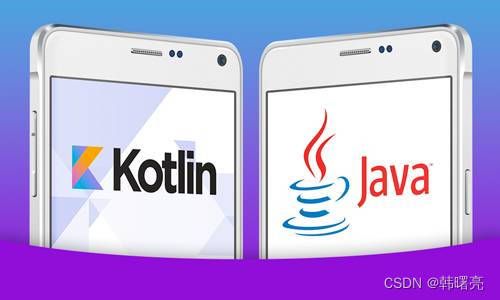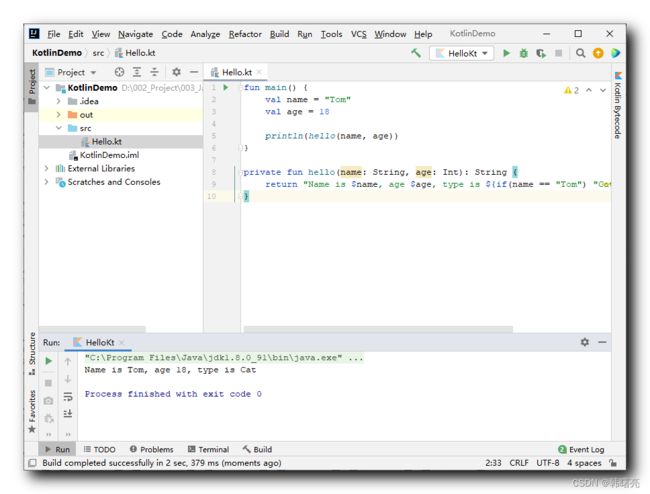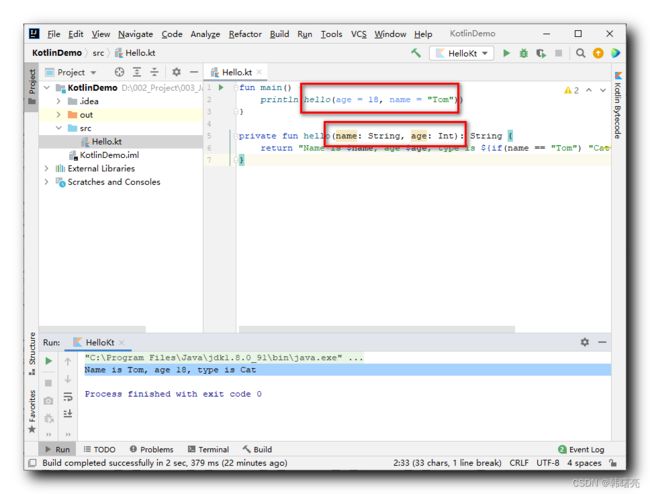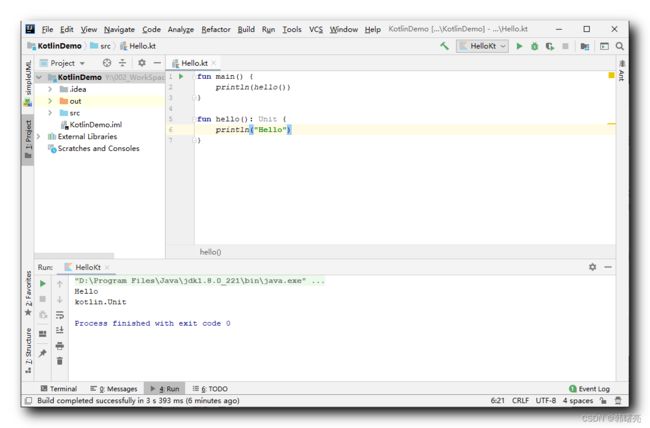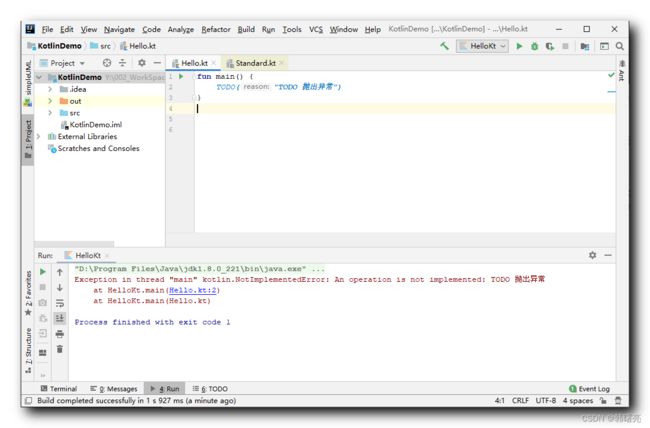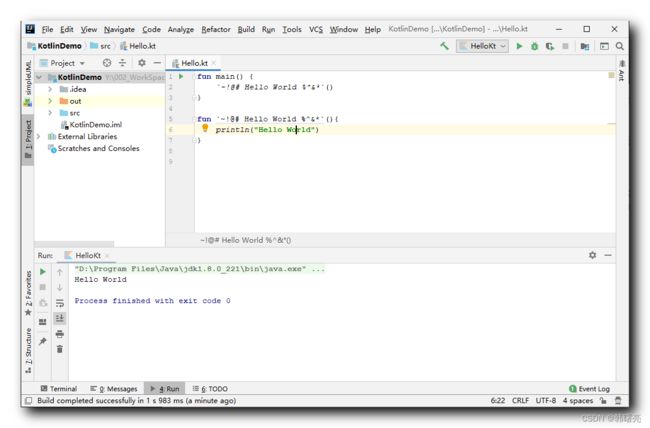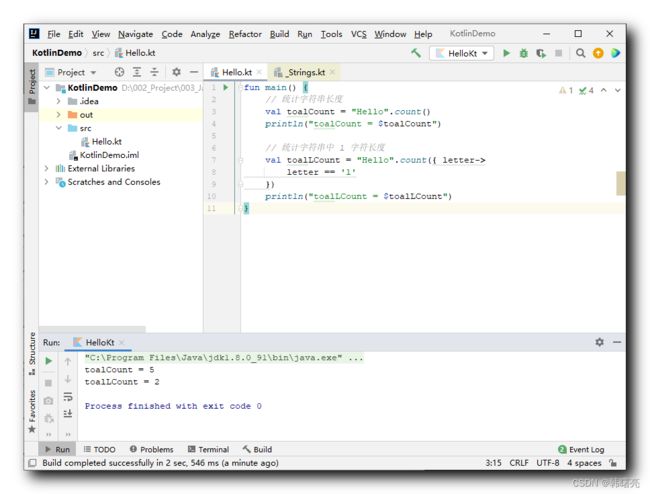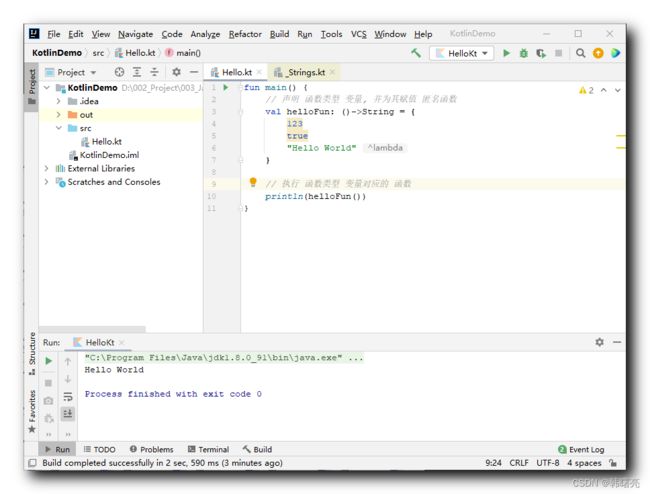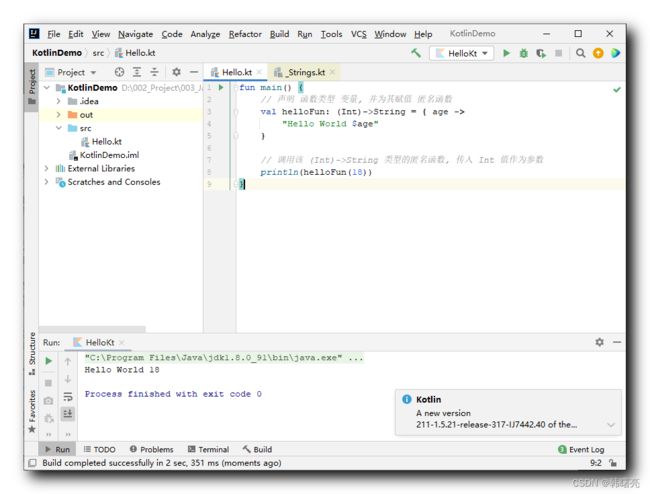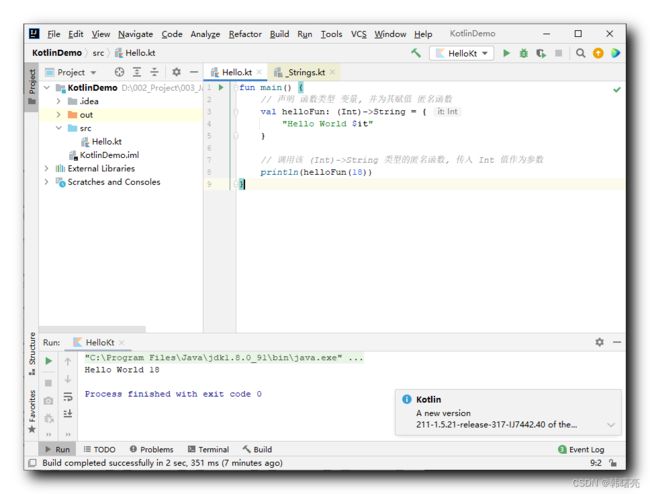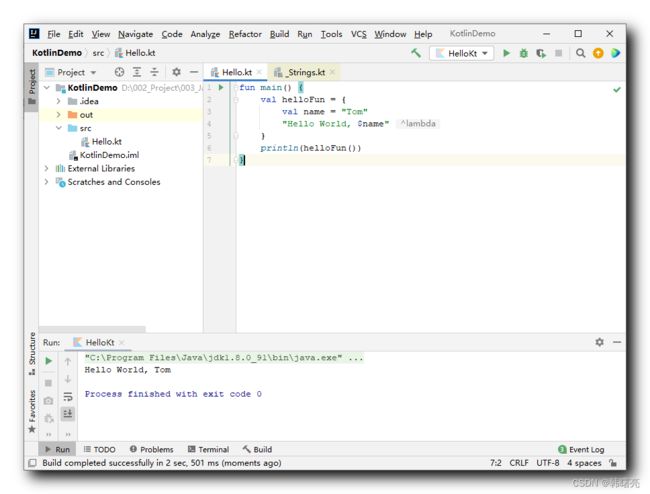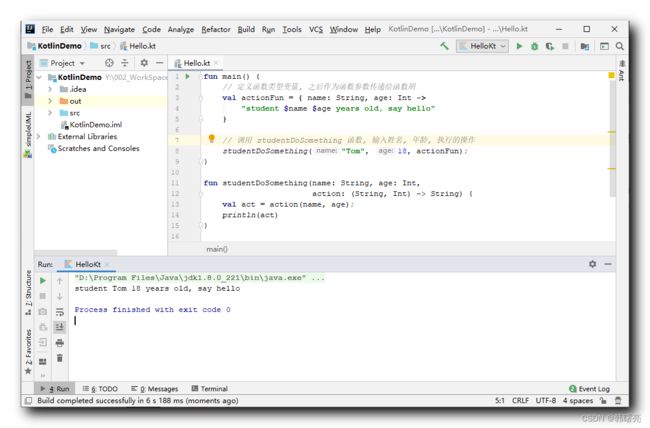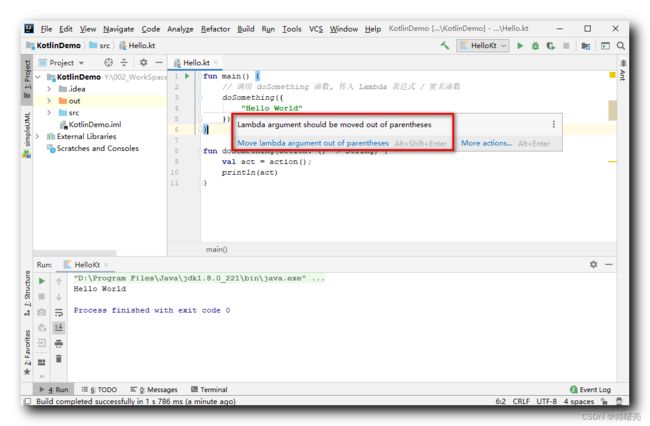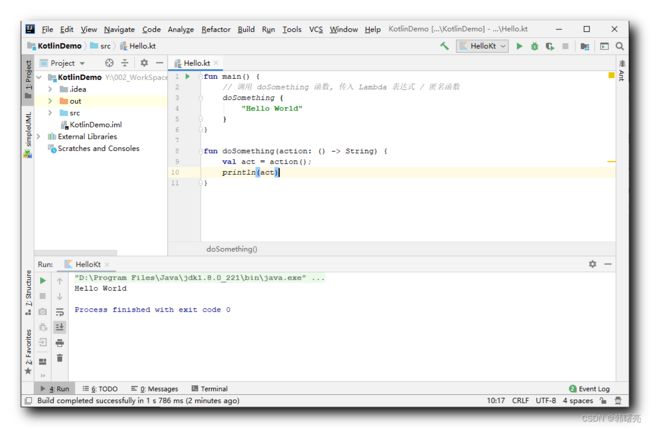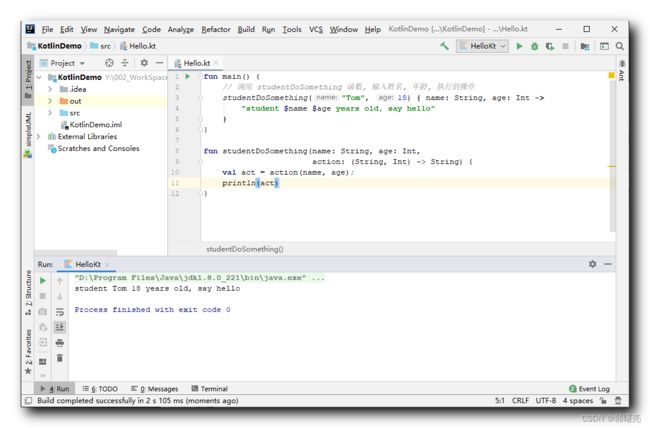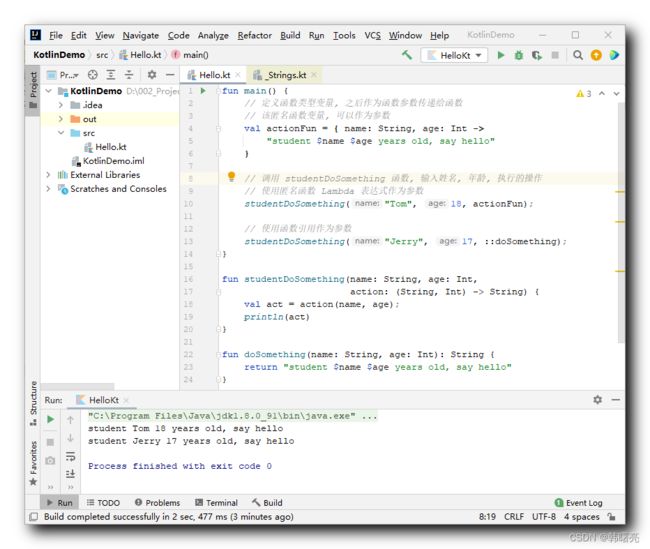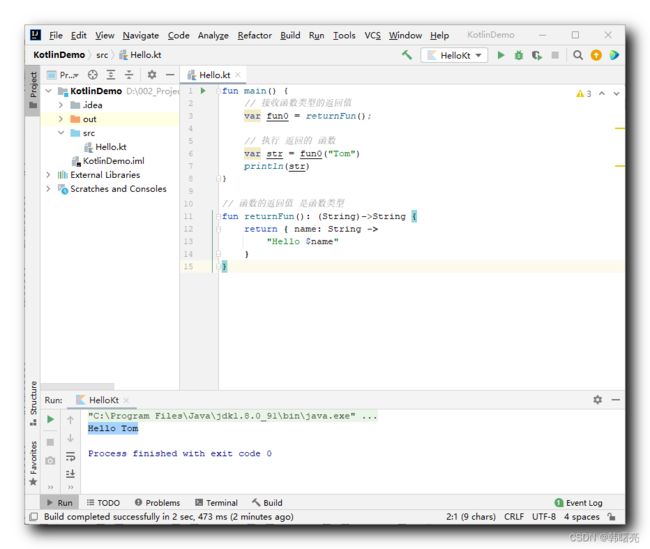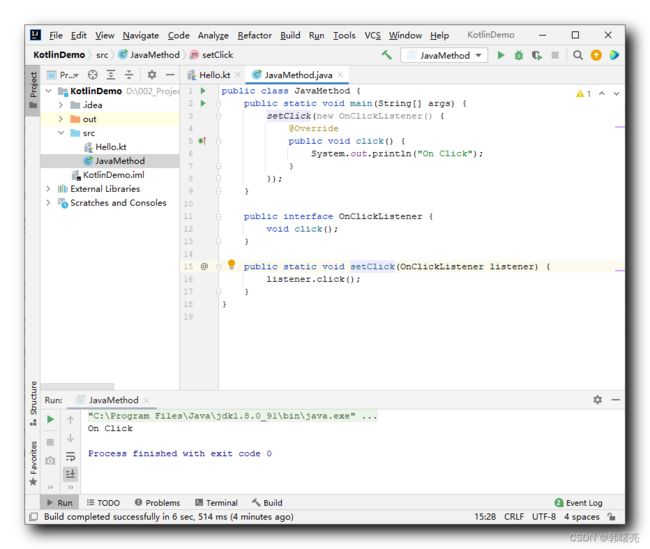【Kotlin】Kotlin 函数总结 ( 具名函数 | 匿名函数 | Lambda 表达式 | 闭包 | 内联函数 | 函数引用 )
文章目录
- 一、函数头声明
- 二、函数参数
-
- 1、默认参数值
- 2、具名参数
- 三、Unit 函数
- 四、TODO 函数抛出异常返回 Nothing 类型
- 五、反引号函数名
- 六、匿名函数
- 七、匿名函数的函数类型
- 八、匿名函数的隐式返回
- 九、匿名函数参数
- 十、匿名函数 it 关键字
- 十一、匿名函数变量类型推断
- 十二、匿名函数参数类型自动推断
- 十三、Lambda 表达式
- 十四、 函数参数为 Lambda 表达式
- 十五、Lambda 表达式作为参数的简略写法
-
- 1、Lambda 表达式作为唯一参数的简略写法
- 2、Lambda 表达式作为最后一个参数的简略写法
- 十六、内联函数
-
- 1、Lambda 表达式弊端
- 2、" 内联 " 机制避免内存开销
- 3、内联函数本质 - 编译时宏替换
- 4、内联函数不能递归
- 十七、普通函数代码示例
- 十八、内联函数代码示例
- 十九、函数引用作为函数参数
- 二十、函数类型作为函数返回值
- 二十一、闭包概念
- 二十二、Java 中函数作为参数的替代方案 ( 匿名内部类 )
一、函数头声明
函数头声明 格式如下 :
可见性修饰符 函数声明关键字 函数名 (函数参数) : 函数返回值类型
函数头示例 :
private fun hello(name:String, age:Int):String
- 可见性修饰符 :
private - 函数声明关键字 :
fun - 函数名 :
hello - 函数参数 :
name:String, age:Int - 函数返回值类型 :
String
代码示例 :
fun main() {
val name = "Tom"
val age = 18
println(hello(name, age))
}
private fun hello(name: String, age: Int): String {
return "Name is $name, age $age, type is ${if(name == "Tom") "Cat" else "Mouse"}"
}
执行结果 :
Name is Tom, age 18, type is Cat
二、函数参数
1、默认参数值
默认参数值 : Kotlin 语言 中的 函数参数 , 可以 在定义时 指定参数默认值 ;
代码示例 :
fun main() {
val name = "Tom"
val age = 18
println(hello())
}
private fun hello(name: String = "Tom", age: Int = 18): String {
return "Name is $name, age $age, type is ${if(name == "Tom") "Cat" else "Mouse"}"
}
执行结果 :
Name is Tom, age 18, type is Cat
2、具名参数
具名参数 : Kotlin 中的 函数参数顺序 必须按照定义的顺序传递 ,
如果使用 具名参数 , 可以不必按照参数顺序传递参数 ;
代码示例 : 在下面的代码中 , 函数参数为 name: String, age: Int ,
先传递 String 类型值 , 然后再传递 Int 类型值 ,
但是使用具名参数 后 , 可以 先传递 Int 参数 , 再传递 String 参数 ;
fun main() {
println(hello(age = 18, name = "Tom"))
}
private fun hello(name: String, age: Int): String {
return "Name is $name, age $age, type is ${if(name == "Tom") "Cat" else "Mouse"}"
}
执行结果 :
Name is Tom, age 18, type is Cat
三、Unit 函数
Java 语言 中 没有返回值的函数 其 返回类型 是 void ;
Kotlin 语言 中 没有返回值的函数 其返回类型是 Unit , 该函数又称为 Unit 函数 ;
Kotlin 语言中 推出 Unit 类型概念 , 是为了 兼容 泛型 概念 ,
如果 函数没有返回值 , 就可以 忽略该类型 , 返回 void ,
但是在 泛型 概念中 , 必须有一个确定的 类型 , 因此这里引入 Unit 类型 ;
代码示例 : 在下面代码的 hello() 函数的返回值类型是 Unit 类型 , 如果打印该返回值 , 打印结果为 kotlin.Unit ;
fun main() {
println(hello())
}
fun hello(): Unit {
println("Hello")
}
执行结果 :
Hello
kotlin.Unit
四、TODO 函数抛出异常返回 Nothing 类型
在 Kotlin 中 有一种函数 TODO 函数 ,
TODO 函数 唯一的作用 就是 抛出异常 ,
该函数 执行永远失败 , 并且 返回 Nothing 类型 ;
TODO 函数原型如下 :
/**
* 总是抛出[NotImplementedError],表示操作未实现。
*
* @param reason一个解释为什么缺少实现的字符串。
*/
@kotlin.internal.InlineOnly
public inline fun TODO(reason: String): Nothing =
throw NotImplementedError("An operation is not implemented: $reason")
代码示例 :
fun main() {
TODO("TODO 抛出异常")
}
执行结果 :
Exception in thread "main" kotlin.NotImplementedError: An operation is not implemented: TODO 抛出异常
at HelloKt.main(Hello.kt:2)
at HelloKt.main(Hello.kt)
五、反引号函数名
Java 的函数名要求 :
- 只能由 字母数字下划线 构成
- 首字母并不能是数字
- 不能是关键字
Kotlin 中 函数名 可以使用 空格 , 特殊字符 , 关键字 , 前提是 该函数名 必须使用 反引号 ;
注意 Kotlin 和 Java 中的关键字不同 , 不管是哪个语言的关键字 , 都不能作为函数名 , 但是如果将关键字 使用反引号 括起来 , 就可以使用其作为函数名 ;
代码示例 :
fun main() {
`~!@# Hello World %^&*`()
}
fun `~!@# Hello World %^&*`(){
println("Hello World")
}
执行结果 :
六、匿名函数
声明函数时 , 没有 函数名 的函数 是 匿名函数 ;
匿名函数 可以作为 函数参数 , 也可以作为 函数返回值 ;
匿名函数 可以 定制修改 已有的 函数 , 如 : 标准库中的函数 ;
Kotlin 中对 CharSequence 类进行了扩展 , 定义了 count(predicate: (Char) -> Boolean) 扩展函数 , 接收一个 (Char) -> Boolean 类型的函数 , 用于 返回匹配给定 匿名函数 的字符数 ;
/**
* 返回匹配给定[谓词 predicate 匿名函数]的字符数。
*/
public inline fun CharSequence.count(predicate: (Char) -> Boolean): Int {
var count = 0
for (element in this) if (predicate(element)) ++count
return count
}
代码示例 : 在下面的代码中 , 传入了 匿名函数
{ letter->
letter == 'l'
}
作为参数 , 其作用是 返回 "Hello" 字符串中 , 字符符合 letter == 'l' 要求的字符个数 ;
fun main() {
// 统计字符串长度
val toalCount = "Hello".count()
println("toalCount = $toalCount")
// 统计字符串中 l 字符长度
val toalLCount = "Hello".count({ letter->
letter == 'l'
})
println("toalLCount = $toalLCount")
}
执行结果 :
toalCount = 5
toalLCount = 2
七、匿名函数的函数类型
匿名函数 可以作为 变量 赋值给 函数类型变量 ,
可以作为 函数参数 传递给函数 ,
因此 , 匿名函数 与 变量 一样 , 也存在 对应的 函数类型 ;
函数类型 由 参数 和 返回值 决定 ;
有 相同 参数顺序 , 参数个数 和 返回值类型 的函数 , 其 函数类型相同 ;
如上个章节 , 扩展函数 CharSequence.count 接收的匿名函数参数 predicate , 其函数类型是 (Char) -> Boolean ;
public inline fun CharSequence.count(predicate: (Char) -> Boolean): Int
代码示例 : 声明一个函数类型变量 , 然后为其赋值 , 最后执行上述函数 ;
fun main() {
// 声明 函数类型 变量
val helloFun: ()->String
// 为 函数类型变量 赋值一个 匿名函数
helloFun = {
"Hello World"
}
// 执行 函数类型 变量对应的 函数
val str = helloFun()
println(str)
}
执行结果 :
Hello World
八、匿名函数的隐式返回
普通函数 返回值 , 都是 显示返回 , 如 : 使用 return 关键字 , 返回返回值 ;
匿名函数 的 返回值 不需要使用 return 关键字 ,
匿名函数 可以 隐式 返回 函数体最后一行语句 ;
代码示例 : 在匿名函数中 , 第一行是 Int 值 , 第二行是 Boolean 值 , 第三行是 String 值 , 最后返回的是最后一行 String 值 ;
fun main() {
// 声明 函数类型 变量, 并为其赋值 匿名函数
val helloFun: ()->String = {
123
true
"Hello World"
}
// 执行 函数类型 变量对应的 函数
println(helloFun())
}
九、匿名函数参数
匿名函数 可以不带参数 , 也可以带多个参数 ;
不带参数的匿名函数 :
// 声明 函数类型 变量, 并为其赋值 匿名函数
val helloFun: ()->String = {
"Hello World"
}
带参数的匿名函数 : 匿名函数 的 参数类型 放在 函数类型 定义中 , 参数名 放在 函数体 内 ;
// 声明 函数类型 变量, 并为其赋值 匿名函数
val helloFun: (Int)->String = { age ->
"Hello World $age"
}
上面的 匿名参数 , 函数类型 是 (Int)->String ,
函数类型 中 , 只有参数类型 , 没有参数名 ,
函数体中 age -> 中 age 就是对应的 Int 类型参数的 参数名 ,
函数体中 , 只有参数名 , 没有参数类型 ;
代码示例 :
fun main() {
// 声明 函数类型 变量, 并为其赋值 匿名函数
val helloFun: (Int)->String = { age ->
"Hello World $age"
}
// 调用该 (Int)->String 类型的匿名函数, 传入 Int 值作为参数
println(helloFun(18))
}
执行结果 :
十、匿名函数 it 关键字
如果 匿名函数 只有 1 个函数参数 , 在 匿名函数 的 函数体 中 , 可以 省略 函数名 声明 , 使用 it 关键字 代替 ;
代码示例 : 在下面的 匿名函数中 , 只有 一个 Int 类型的函数参数 , 在函数体中可以省略 age -> 参数名 声明 , 可以 使用默认的 it 关键字 作为 参数名 ;
fun main() {
// 声明 函数类型 变量, 并为其赋值 匿名函数
val helloFun: (Int)->String = {
"Hello World $it"
}
// 调用该 (Int)->String 类型的匿名函数, 传入 Int 值作为参数
println(helloFun(18))
}
执行结果 :
Hello World 18
十一、匿名函数变量类型推断
定义变量 时 , 如果将变量值 直接赋值给该变量 , 那么就可以 不用显示声明该变量的类型 ;
下面的代码中 , 定义 name 变量 , 为其 赋值 “Tom” 字符串 String 类型变量值 , 则 该变量被自动推断为 String 类型变量 ;
var name = "Tom"
如果 变量没有赋值 , 则声明变量时 , 必须显示声明该变量的类型 ;
var name: String
如果定义一个 函数类型 变量 , 将 匿名函数 作为变量值 赋值给该变量 , 此时可以 不需要显示声明 函数类型 变量的值 ;
下面的代码中的 函数类型 : ()->String 可以省略 , 由 类型推断 来确定 helloFun 只读变量的值 ;
val helloFun: ()->String = {
val name = "Tom"
"Hello World, $name"
}
代码示例 : 如下代码中 , helloFun 变量没有设置变量类型 , 其类型由 赋值给 该变量的 匿名函数 的 类型自动推断得来 , 匿名函数类型为 ()->String 类型 ;
fun main() {
val helloFun = {
val name = "Tom"
"Hello World, $name"
}
println(helloFun())
}
十二、匿名函数参数类型自动推断
如果 需要 使用 自动类型推断 确定 匿名函数 的 参数类型 ,
则在 匿名函数 的 函数体中 , 必须 显示声明 匿名函数 的 变量名 和 变量类型 ;
匿名函数 返回值 类型 , 是根据 匿名函数 函数体 中 最后一行表达式的值 进行自动推断的 ;
代码示例 : 在下面的函数中 , 匿名函数的函数体中 , 使用 变量名: 变量类型 -> , name: String, age: Int -> , 显示声明了匿名函数的 参数类型 , 这样就可以使用 类型推断 , 自动推断出 匿名函数 的参数类型 ;
该匿名函数 函数体 最后一行表达式 的 类型 是 String 类型 , 其 返回值类型就是 String 类型 ;
fun main() {
val helloFun = { name: String, age: Int ->
"Hello World, $name, $age"
}
println(helloFun("Tom", 18))
}
执行结果 :
Hello World, Tom, 18
如果 不使用 匿名函数 类型推断 ,
则在 函数变量 声明时 , 确定 函数参数 类型 ,
在 匿名函数 函数体 中 , 确定 函数参数名 即可 ,
示例代码如下 :
fun main() {
val helloFun: (String, Int)->String = { name, age ->
"Hello World, $name, $age"
}
println(helloFun("Tom", 18))
}
执行结果 :
Hello World, Tom, 18
十三、Lambda 表达式
匿名函数 又称为 Lambda 表达式 , 匿名函数的 返回值 是 Lambda 结果 ;
十四、 函数参数为 Lambda 表达式
在 定义函数 时 , 函数的参数 可以是 函数类型的变量 ,
可以传递一个 匿名函数 作为 函数参数 ;
匿名函数 就是 Lambda 表达式 ;
代码示例 : 在下面的代码中 ,
- 函数参数 :
studentDoSomething 函数的 第三个参数为 action: (String, Int) -> String ,
其参数类型为 (String, Int) -> String , 是一个 函数类型 ;
- 函数类型变量 :
在 main 函数中 , 定义函数类型变量 actionFun , 之后 该变量会作为函数参数传递给函数 ,
同时使用了 匿名函数 , 为该函数类型变量 actionFun 赋值 ;
- 匿名函数类型自动推断 :
在该 匿名函数中 , 使用了 自动类型推断 , 在函数体中的参数列表 ,
声明了 完整的 参数名:参数类型 , name: String, age: Int -> ;
- 函数变量作函数参数 :
在最后 , 将 函数类型 变量 actionFun 传递给了 studentDoSomething 函数 , 作为其第三个参数使用 ;
fun main() {
// 定义函数类型变量, 之后作为函数参数传递给函数
val actionFun = { name: String, age: Int ->
"student $name $age years old, say hello"
}
// 调用 studentDoSomething 函数, 输入姓名, 年龄, 执行的操作
studentDoSomething("Tom", 18, actionFun);
}
fun studentDoSomething(name: String, age: Int,
action: (String, Int) -> String) {
val act = action(name, age);
println(act)
}
执行结果 :
student Tom 18 years old, say hello
十五、Lambda 表达式作为参数的简略写法
1、Lambda 表达式作为唯一参数的简略写法
如果 Lambda 表达式 作为 函数参数 , 并且 该参数是 唯一参数 , 那么 Lambda 表达式外面的圆括号可以省略 ;
代码示例 :
fun main() {
// 调用 doSomething 函数, 传入 Lambda 表达式 / 匿名函数
doSomething({
"Hello World"
})
}
fun doSomething(action: () -> String) {
val act = action();
println(act)
}
此时将鼠标移动到 Lambda 表达式 上 , 也就是匿名函数中 , 会提示
Lambda argument should be moved out of parentheses
参数应该移出圆括号
Kotlin 建议我们移除 Lambda 表达式 外面的圆括号 ;
fun main() {
// 调用 doSomething 函数, 传入 Lambda 表达式 / 匿名函数
doSomething {
"Hello World"
}
}
fun doSomething(action: () -> String) {
val act = action();
println(act)
}
2、Lambda 表达式作为最后一个参数的简略写法
如果 Lambda 表达式 作为 函数参数 , 并且 该参数是 若干参数的最后一个参数 , 那么 Lambda 表达式可以提到括号外面 ;
在上一个章节的如下代码 , 可以直接 将 匿名函数 作为函数参数进行传递 , 不必使用 函数类型 变量名作为参数 ,
fun main() {
// 定义函数类型变量, 之后作为函数参数传递给函数
val actionFun = { name: String, age: Int ->
"student $name $age years old, say hello"
}
// 调用 studentDoSomething 函数, 输入姓名, 年龄, 执行的操作
studentDoSomething("Tom", 18, actionFun);
}
直接使用匿名函数作为函数参数 的效果 :
fun main() {
// 调用 studentDoSomething 函数, 输入姓名, 年龄, 执行的操作
studentDoSomething("Tom", 18, { name: String, age: Int ->
"student $name $age years old, say hello"
})
}
匿名函数 , 也就是 Lambda 表达式 作为最后一个参数 , 可以提取到括号外面 , 代码效果如下 :
fun main() {
// 调用 studentDoSomething 函数, 输入姓名, 年龄, 执行的操作
studentDoSomething("Tom", 18) { name: String, age: Int ->
"student $name $age years old, say hello"
}
}
最终的简化后的代码示例 :
fun main() {
// 调用 studentDoSomething 函数, 输入姓名, 年龄, 执行的操作
studentDoSomething("Tom", 18) { name: String, age: Int ->
"student $name $age years old, say hello"
}
}
fun studentDoSomething(name: String, age: Int,
action: (String, Int) -> String) {
val act = action(name, age);
println(act)
}
执行结果 :
student Tom 18 years old, say hello
十六、内联函数
1、Lambda 表达式弊端
Lambda 表达式弊端 :
Lambda 表达式 的 灵活使用 , 是以 牺牲内存开销为代价的 ;
在 Java 虚拟机中 , Lambda 表达式 是以 实例对象 的形式 , 存储在堆内存中的 , 这就产生了内存开销 ;
2、" 内联 " 机制避免内存开销
" 内联 " 机制避免内存开销 :
在 Kotlin 语言中提供了一种 " 内联 " 机制 ,
解决了上面的 Lambda 表达式的 内存开销 问题 ,
将 使用 Lambda 表达式 作为参数的函数 定义为 inline 内联函数 ,
Java 虚拟机就 不会再为 lambda 表达式 在堆内存中 创建 实例对象 了 ,
这样就 避免了 Lambda 表达式 的内存开销 ;
3、内联函数本质 - 编译时宏替换
内联函数使用 :
在使用 Lambda 表达式的时候 ,
Kotlin 编译器直接将 inline 内联函数 的 函数体 直接拷贝到 使用位置 ;
内联函数 类似于 C 语言中的 预编译指令 宏定义 , 在编译时直接替换拷贝宏定义内容 ;
Kotlin 中的 内联函数 也是一种 编译时 进行 宏替换的操作 ;
4、内联函数不能递归
内联函数不能递归 :
如果 将函数 定义为 内联函数 ,
则该函数 不能进行递归操作 ,
递归操作 会导致 函数体的 无限复制粘贴 ,
编译器会报警 ;
十七、普通函数代码示例
代码示例 : 下面的代码中 studentDoSomething 是普通函数 ;
fun main() {
// 定义函数类型变量, 之后作为函数参数传递给函数
val actionFun = { name: String, age: Int ->
"student $name $age years old, say hello"
}
// 调用 studentDoSomething 函数, 输入姓名, 年龄, 执行的操作
studentDoSomething("Tom", 18, actionFun);
}
fun studentDoSomething(name: String, age: Int,
action: (String, Int) -> String) {
val act = action(name, age);
println(act)
}
将字节码转换为 Java 代码内容如下 :
import kotlin.Metadata;
import kotlin.jvm.functions.Function2;
import kotlin.jvm.internal.Intrinsics;
import org.jetbrains.annotations.NotNull;
@Metadata(
mv = {1, 1, 16},
bv = {1, 0, 3},
k = 2,
d1 = {"\u0000\u001c\n\u0000\n\u0002\u0010\u0002\n\u0002\b\u0002\n\u0002\u0010\u000e\n\u0000\n\u0002\u0010\b\n\u0000\n\u0002\u0018\u0002\n\u0000\u001a\u0006\u0010\u0000\u001a\u00020\u0001\u001a0\u0010\u0002\u001a\u00020\u00012\u0006\u0010\u0003\u001a\u00020\u00042\u0006\u0010\u0005\u001a\u00020\u00062\u0018\u0010\u0007\u001a\u0014\u0012\u0004\u0012\u00020\u0004\u0012\u0004\u0012\u00020\u0006\u0012\u0004\u0012\u00020\u00040\b¨\u0006\t"},
d2 = {"main", "", "studentDoSomething", "name", "", "age", "", "action", "Lkotlin/Function2;", "KotlinDemo"}
)
public final class HelloKt {
public static final void main() {
Function2 actionFun = (Function2)null.INSTANCE;
studentDoSomething("Tom", 18, actionFun);
}
// $FF: synthetic method
public static void main(String[] var0) {
main();
}
public static final void studentDoSomething(@NotNull String name, int age, @NotNull Function2 action) {
Intrinsics.checkParameterIsNotNull(name, "name");
Intrinsics.checkParameterIsNotNull(action, "action");
String act = (String)action.invoke(name, age);
boolean var4 = false;
System.out.println(act);
}
}
十八、内联函数代码示例
代码示例 : 下面的代码中 studentDoSomething 是内联函数 ;
fun main() {
// 定义函数类型变量, 之后作为函数参数传递给函数
val actionFun = { name: String, age: Int ->
"student $name $age years old, say hello"
}
// 调用 studentDoSomething 函数, 输入姓名, 年龄, 执行的操作
studentDoSomething("Tom", 18, actionFun);
}
inline fun studentDoSomething(name: String, age: Int,
action: (String, Int) -> String) {
val act = action(name, age);
println(act)
}
将字节码转换为 Java 代码内容如下 :
import kotlin.Metadata;
import kotlin.jvm.functions.Function2;
import kotlin.jvm.internal.Intrinsics;
import org.jetbrains.annotations.NotNull;
@Metadata(
mv = {1, 1, 16},
bv = {1, 0, 3},
k = 2,
d1 = {"\u0000\u001c\n\u0000\n\u0002\u0010\u0002\n\u0002\b\u0002\n\u0002\u0010\u000e\n\u0000\n\u0002\u0010\b\n\u0000\n\u0002\u0018\u0002\n\u0000\u001a\u0006\u0010\u0000\u001a\u00020\u0001\u001a3\u0010\u0002\u001a\u00020\u00012\u0006\u0010\u0003\u001a\u00020\u00042\u0006\u0010\u0005\u001a\u00020\u00062\u0018\u0010\u0007\u001a\u0014\u0012\u0004\u0012\u00020\u0004\u0012\u0004\u0012\u00020\u0006\u0012\u0004\u0012\u00020\u00040\bH\u0086\b¨\u0006\t"},
d2 = {"main", "", "studentDoSomething", "name", "", "age", "", "action", "Lkotlin/Function2;", "KotlinDemo"}
)
public final class HelloKt {
public static final void main() {
Function2 actionFun = (Function2)null.INSTANCE;
String name$iv = "Tom";
int age$iv = 18;
int $i$f$studentDoSomething = false;
String act$iv = (String)actionFun.invoke(name$iv, Integer.valueOf(age$iv));
boolean var5 = false;
System.out.println(act$iv);
}
// $FF: synthetic method
public static void main(String[] var0) {
main();
}
public static final void studentDoSomething(@NotNull String name, int age, @NotNull Function2 action) {
int $i$f$studentDoSomething = 0;
Intrinsics.checkParameterIsNotNull(name, "name");
Intrinsics.checkParameterIsNotNull(action, "action");
String act = (String)action.invoke(name, age);
boolean var5 = false;
System.out.println(act);
}
}
十九、函数引用作为函数参数
函数 作为参数 , 有两种方式 :
- 传递 Lambda 表达式 , 也就是 匿名函数 作为参数值 ;
- 传递 函数引用 作为参数值 ;
函数引用 可以将 具名函数 转为 函数的参数值 , 只要可以使用 Lambda 表达式 参数的地方 , 就可以使用 函数引用 进行替代 ;
函数引用格式 : 两个冒号 加上 函数名 , 就是函数引用 ;
::函数名
如下 doSomething 函数的 函数引用 是 ::doSomething ;
fun doSomething(name: String, age: Int): String {
return "student $name $age years old, say hello"
}
具名函数 与 匿名函数 相对 , 具名函数 是有 函数名的函数 , 匿名函数 没有函数名 ;
代码示例 : 在下面的代码中 ,
首先使用 actionFun 函数类型变量 作为 studentDoSomething 函数的参数 , 该变量的值是一个 匿名函数 Lambda 表达式 ,
然后使用 doSomething 函数的 函数引用 ::doSomething 作为 studentDoSomething 函数的参数 ,
使用 匿名函数 Lambda 表达式 作为参数 与 使用 函数引用 作为参数 , 其效果是相同的 ;
fun main() {
// 定义函数类型变量, 之后作为函数参数传递给函数
// 该匿名函数变量, 可以作为参数
val actionFun = { name: String, age: Int ->
"student $name $age years old, say hello"
}
// 调用 studentDoSomething 函数, 输入姓名, 年龄, 执行的操作
// 使用匿名函数 Lambda 表达式作为参数
studentDoSomething("Tom", 18, actionFun);
// 使用函数引用作为参数
studentDoSomething("Jerry", 17, ::doSomething);
}
fun studentDoSomething(name: String, age: Int,
action: (String, Int) -> String) {
val act = action(name, age);
println(act)
}
fun doSomething(name: String, age: Int): String {
return "student $name $age years old, say hello"
}
执行结果 :
student Tom 18 years old, say hello
student Jerry 17 years old, say hello
二十、函数类型作为函数返回值
函数 的 返回值类型 , 也可以是 函数类型 ;
也就是说 匿名函数 , Lambda 表达式 可以作为 函数的返回值 ;
代码示例 : 下面的代码中 ,
returnFun 函数的返回值 是一个函数类型 (String)->String , 返回的是一个 匿名函数 Lambda 表达式 ;
使用 var fun0 变量 接收 上述函数 返回的 Lambda 表达式 , 并执行该 匿名函数 ;
fun main() {
// 接收函数类型的返回值
var fun0 = returnFun();
// 执行 返回的 函数
var str = fun0("Tom")
println(str)
}
// 函数的返回值 是函数类型
fun returnFun(): (String)->String {
return { name: String ->
"Hello $name"
}
}
执行结果 :
Hello Tom
二十一、闭包概念
匿名函数 就是 Lambda 表达式 , 同时也是 闭包 , 三者的是相同的概念 ;
闭包意义 :
在 Java 中 , 通过 Package 包 , Class 类 , 将作用域区分开 ,
将变量 定义在 不同的 包 或 类中 , 可以很明显的将作用域区分开 ;
如果没有 Class 类 , 在一个 脚本文件 中 , 如 Kotlin 的脚本 , 就需要 使用 函数 进行作用域区分 ,
将一个作用域内的相关代码 , 都写在一个函数中 , 这样就可以将作用域分区分开 ;
匿名函数 作用域 :
在 匿名函数 / Lambda 表达式 / 闭包 中 , 可以 引用 作用域 之外的变量 ,
如 :
在 函数 A 中定义了 匿名函数 B , 则 在 匿名函数 B 中 , 可以引用 函数 A 中的变量 和 全局变量 ;
在 匿名函数 B 中定义了 匿名函数 C , 则 在 匿名函数 C 中 , 可以引用 匿名函数 B , 函数 A 中的变量 和 全局变量 ;
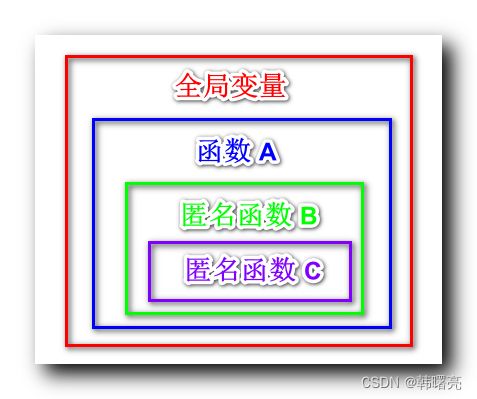
在 函数 A 中 , 不能引用 匿名函数 B 和 匿名函数 C 中的变量 ;
在 匿名函数 B 中 , 不能引用 匿名函数 C 中的变量 ;
高级函数概念 :
在 函数式编程 中 , 经常使用 高级函数 , 高级函数 是使用 函数类型变量 作为 参数 或 返回值 的 函数 ;
使用 匿名函数 / Lambda 表达式 / 闭包 作为 参数 / 返回值 的函数 是 高级函数 ;
Kotlin 中经常使用 链式调用 , 就是 函数式编程 的风格 ;
二十二、Java 中函数作为参数的替代方案 ( 匿名内部类 )
Kotlin 中引入 函数类型 , 将 匿名函数 / Lambda 表达式 / 闭包 作为 函数参数 或 返回值 , 可以写出 更加灵活的代码 ;
Java 8 开始 支持 Lambda 表达式 , 但是 不支持 函数 作为参数 , 也 不支持将 函数 赋值给变量 ;
Java 语言 将 函数 作为参数 的 替代方案 是 : 使用 匿名内部类 作为函数参数 ;
代码示例 : Java 代码中 , 接收 OnClickListener listener 类型的接口类型参数 , 在实际使用时 , 可以传入一个匿名内部类作为参数 , 将函数实现在匿名内部类中 ;
public class JavaMethod {
public static void main(String[] args) {
setClick(new OnClickListener() {
@Override
public void click() {
System.out.println("On Click");
}
});
}
public interface OnClickListener {
void click();
}
public static void setClick(OnClickListener listener) {
listener.click();
}
}
